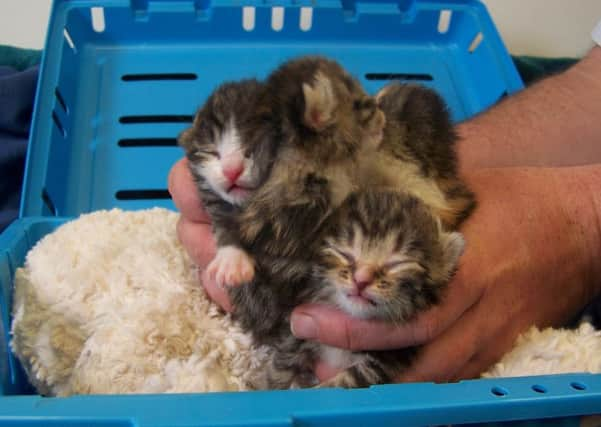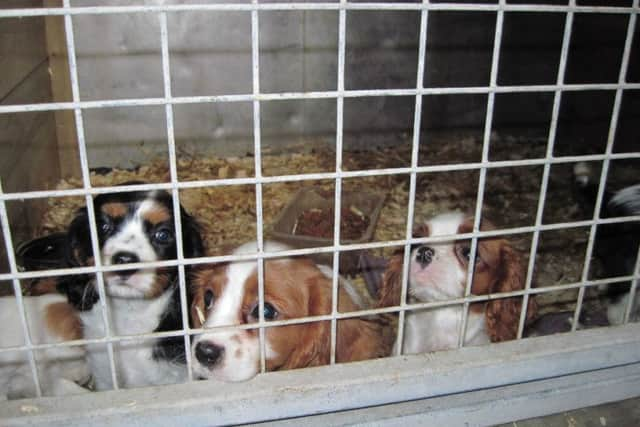Impulse pet buys damaging animal welfare in Scotland


This lack of knowledge can result in stressed, lonely, obese and aggressive pets, according to the UK’s leading vet charity, PDSA.
One in five (21 per cent) of pet owners in Scotland have admitted they didn’t carry out any research before getting a new pet.
Advertisement
Hide AdAdvertisement
Hide AdA ‘want it now’ consumer culture is evident in pet purchasing with over 4.5 million in Britain doing no research at all before getting a pet. Familiarity with the Animal Welfare Act has decreased significantly over the last five years, with only 31 per cent of pet owners stating they are familiar with their responsibility as a pet owner as detailed in this legislation which outlines the basic welfare needs of our pets.


Findings from the fifth annual PDSA Animal Wellbeing (PAW) Report, the largest, most comprehensive insight into the state of our pet nation, shows millions of pets are still suffering in silence. Produced by PDSA in conjunction with YouGov, the PAW Report is the biggest-ever annual survey of pet owners and veterinary professionals, uncovering the truth about pet wellbeing in the UK.
Results have shown that eight per cent of Scottish pet owners think the cost of their pet will be under £500 for its entire lifetime – a huge underestimate. A cat, for example, can cost £17,000, while one in 12 dogs in Scotland have never been taken on a walk - despite it being fundamental for their physical and mental wellbeing.
In total 29 per cent of dog owners also feel it is acceptable to leave a dog alone for six to ten hours, and 18 per cent would consider buying from a puppy farm - an intensive establishment where dogs are bred in high volumes for profit, with little or no consideration for the health or welfare of puppies or breeding bitches.
This leaves Scotland the joint worst finding in Britain, matched only in East Midlands.


PDSA Head of Pet Health and Welfare, and vet, Nicola Martin, said: “PDSA’s research shows that as a nation, we’re still in love with the idea of pet ownership with over half of UK households owning a pet and 88 per cent of pet owners believing that owning a pet improves their lives. But impulse acquisitions and busy lifestyles mean some people are totally unprepared for the realities, and the effort, that owning a happy, healthy pet entails.
“Sadly, too many people are continuing to underestimate the financial cost and the importance of choosing the right pet for their lifestyle before taking on a new pet. Ultimately, this is contributing to the suffering of millions of pets.
“This needs to change and we all need to stop and think whether we are providing everything that our pets need to live healthy and happy lives.”
Advertisement
Hide AdAdvertisement
Hide AdTo tackle these serious welfare issues, PDSA is launching #PawsFirst - a campaign which highlights the problem of rushing into getting a pet without understanding their needs as well as highlighting important information for new pet owners:
Dogs
2.3 million dogs (25 per cent of the UK dog population) are routinely left alone for five hours or more, while advice suggests that four hours should be the maximum time.
28 per cent of dog owners believe it’s acceptable to regularly leave a dog home alone on a typical day for six to ten hours.
465,000 dogs (five per cent) are never taken for a walk (on the lead for ten minutes or more) despite daily walks and socialisation with other dogs being essential for a dog’s physical and mental health.
465,000 dogs (five per cent) show aggression towards other pets every week.
Cats
2.6 million cats (24 per cent of the UK cat population) live indoors all the time, which could be causing stress and contributing to feline obesity.
4.8 million cats (44 per cent live in multi-cat households and of these 58 per cent have to share their food and water bowls and 50 per cent their litter tray, which can be source of significant stress for cats.
2.8 million cats (26 per cent) have never been vaccinated, leaving them susceptible to fatal diseases.
Rabbits
Advertisement
Hide AdAdvertisement
Hide AdNearly 700,000 rabbits (57 per cent of the UK rabbit population) live alone, potentially causing mental suffering for the highly-social animals.
29 per cent of rabbit owners feed rabbit muesli, despite this leading to painful dental disease and poor nutrition.
29 per cent of rabbits are provided with less than the recommended amount of hay, which is an amount equivalent to their body size or more every day.